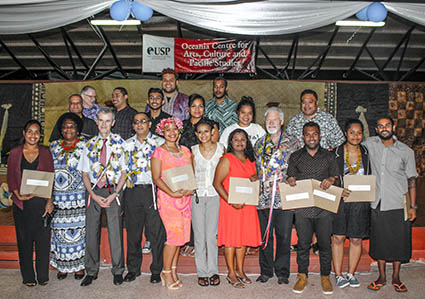
Irene Manarae
SUVA (Wansolwara / Pacific Media Watch): Journalists should be the compass for citizens who could otherwise be easily lost in today’s digital world of overwhelming information, says French Ambassador to Fiji Michel Djokovic.
He made the comment during his address as chief guest at the University of the South Pacific Journalism Awards night on Friday.
The awards, organised annually by the USP Journalism Programme to celebrate students achievements, was sponsored by the embassy and the university’s Faculty of Arts, Language and Education, of which the journalism discipline is a part of.
“In today’s world, information is everywhere and it’s very easy to mislead people by false rumors on social networks or publication of unverified news that will go viral on the internet.
“To be well informed and, I mean reliably informed, professional journalists are of paramount importance.”
He said good journalists were critical for a vibrant democracy, and this was why the training of journalists was important.
Djokovic added that he had observed how the Fiji media was largely comprised of young people.
“This is a good thing, because you need to be passionate and energetic for such a demanding job.
“But young people, by definition, have less experience than the elders and need to be trained. We are always happy to help, and I’m sure that many of my colleagues from the diplomatic corps would be happy to join too.”
He noted that training needs would need to identified by the industry players, like the Fijian Media Association.
The ambassador said he was very proud of the fact that it was the French Embassy that had financially backed the establishment of the journalism programme at USP 21 years ago.
This, he said, was aligned with France’s strong commitment to the freedom of expression, press freedom and the protection of journalists.
It was another reason his office chose to support the programme on its special night, said Djokovic.
He said journalists were usually the first to suffer when freedom of expression was restricted, and he referenced the slaughter of journalists at France’s Charlie Hebdo weekly newspaper earlier this year.
“The reaction in the world [to the Charlie Hebdo killings] was tremendous, showing that brutality can’t stop ideas and that the pen is stronger than the sword."
The awards night was also attended by the US Ambassador Judith Cefkin; the former coordinator of USP Journalism and now director of Auckland University of Technology’s Pacific Media Centre, Professor David Robie - keynote speaker for the awards; Director of Public Prosecutions Christopher Pryde, Deputy Vice-Chancellor (Learning & Teaching) Professor Richard Coll; Deputy Vice-Chancellor (Research) Derrick Armstrong and the United Liberation Movement for West Papua (ULMWP) media advisor and communications specialist Joey Tau.
The programme’s news media partners were also present large numbers, including Fiji Television’s chief executive Geoffrey Smith; Pacific Islands News Association manager and editor Makereta Komai, Fiji Sun’s manager online content Rosi Tamani (USP Journalism alumni), Fiji Broadcasting Corporation’s news director Indra Singh, Fiji Times’chief subeditor Sakiasi Nawaikama (alumni), cover story director and former communications specialist Snehal Morris; and Fiji Live editor Reginald Chandar.
The traditional strong support from the USP Journalism alumni was evident in their turnout, and leading the charge were senior journalists Rachna Nath and Maggie Boyle who were MCs for the event.
Top students receive awards - full list
This work is licensed under a Creative Commons Attribution-NonCommercial 3.0 New Zealand Licence.




